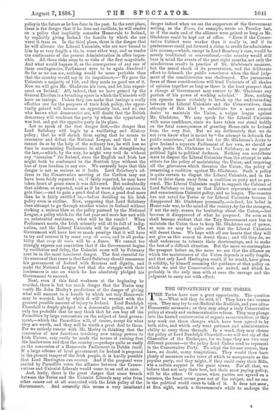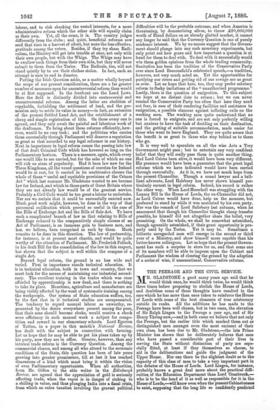THE OPPORTUNITY OF THE TORIES.
THE Tories have now a great opportunity. The question is,—What will they do with it They have two courses open. They may try to out-Radical the Radicals, and pass ultra- Democratic measures ; or they may adopt a truly Conservative policy of steady and undemonstrative reform. They may plunge into the heated controversies of organic reconstructioe, or they may work out those changes which have been agreed to by- both sides, and which only want patience and administrative ability to carry them through. In a word, they may choose the policy of Lord Randolph Churchill—we will not say of the Chancellor of the Exchequer, for we hope they are two very different persons—or the policy Lord Cairns used to represent in the Conservative Party. To adopt the former course, they have, no doubt, many temptations. They would then have plenty of measures under cover of which to masquerade as the popular party, and they might, if they could carry their Bills, win a certain support in the great towns. For all that, we believe that not only their best, but their most paying policy, will be the other. Of course, when parties are agreed on a measure, the heart seems gone out of the subject, and no one in the political world cares to talk of it. It does not seem., at first eight, worth a Government's while to undergo the labour, and to risk shocking the vested interests, for a mere administrative reform which the other side will equally claim as their own. Yet, all the same, it is. The country judges differently from the clubs ; and quiet, beneficial reforms sow seed that rises in A harvest of silent, but none the less effective, gratitude among the voters. Besides, if they try sham Radi- calism, the Ministry will get into trouble at once, not only with their own people, but with the Whigs. The Whigs may have to swallow such things from their own side, but they will never submit to them from the Tories. The Radicals, too, will not stand quietly by to see their clothes stolen. In fact, such an attempt is sure to end in disaster. Putting the Irish Question aside, as a matter wholly beyond the scope of our present consideration, there are a far greater number of measures open for uncontroversial reform than would be at first supposed. In the forefront are the Land Laws. Here the field is distinctly divided into controversial and uncontroversial reforms. Among the latter are abolition of copyholds, forbidding the settlement of land, and the per- mission only to settle its value in money—in fact, an extension of the present Settled Land Act, and the establishment of a cheap and simple registration of title. On these every one is agreed, and they only await the painful and laborious work of the draftsman. To bring about these reforms efficiently, how- ever, would be no easy task ; and the politician who carries them successfully through Parliament will deserve a reputation as great as that accorded to any legal reformer in our history. Next in importance in legal reform comes the passing into law of that draft Criminal Code which has hovered so long on the Parliamentary horizon. There is a measure, again, which every one would like to see carried, but for the sake of which no one will risk an atom of popularity. Had it been law now for the Three Kingdoms, all the vexed questions of coercion for Ireland would be at rest, for it carried in its unobtrusive clauses the whole of those "useful and equitable provisions of the Crimes Act" which last summer Mr. Gladstone wanted to see become law for Ireland, and which in those parts of Great Britain where they are not already law would be of the greatest service. Probably a Civil Code would be too great a labour to undertake. Nor are we certain that it could be successfully enacted now. Much good work might, however, be done in the way of that piecemeal codification which proved so useful in the case of the Bills of Exchange Act and the Bills of Sale Act. To have such a complicated branch of law as that relating to Bills of Exchange reduced to the comparatively simple clauses of an Act of Parliament, is an immense gain to business men, and has, we believe, been recognised as such by them. Much remains to be done in this direction. The law of partnership, for instance, is at present most chaotic, and would be quite worthy of the attention of Parliament. Mr. Frederick Pollock, in his draft Bill for the consolidation of the law in this respect, has shown that the subject is well within the compass of a single Act.
Beyond legal reform, the ground is no less wide and varied. First in importance stands technical education. It is in technical education, both in town and country, that we must look for the means of maintaining our industrial ascend- ency. The excellent training in the trades which was once afforded by apprenticeship is now dead, and there is nothing to take its place. Meantime, agriculture and manufacture are being visibly affected by the want of systematic training among the workpeople. Our system of State education suffers, too, by the fact that in it technical studies are unrepresented. The tendency to regard manual labour as unworthy, re- presented by the desire everywhere present among the poor, that their sons should become clerks, would receive a check were efficiency in such manual work a subject for compe- tition and reward in our elementary schools. Lord Egerton of Tatton, in a paper in this month's National Review, has dealt with the subject in connection with farming. Let us hope that he may be able to get his plans taken up by his party, now they are in office. Greater, however, than any internal trade reform is the Currency Question. Among the commercial classes, and among all who attend to the economic conditions of the State, this question has been of late years growing into greater prominence, till at last it has reached dimensions of a kind which must bring it within the vision of even Parliamentary opportunists. When all authorities, from Mr. Giffen to the able writer in the Edinburgh Review, are agreed that the appreciation of gold is seriously affecting trade, when the rupee is in danger of sinking to a shilling in value, and thus plunging India into a fiscal crisis, from which an extra taxation involving the gravest political difficulties will be the probable outcome, and when America is threatening, by demonetising silver, to throw £20,000,000 worth of Bland dollars on an already glutted market, it cannot any longer be said that the Currency Question is one of purely academic interest. We by no means suggest that the Govern- ment should plunge into any rash monetary experiments, but only point out how grave and how important a question is at hand for them to deal with. To deal with it successfully would win them golden opinions from the whole trading community. Sanitation has been the tradition of the Conservative Party ever since Lord Beaconsfield's celebrated speech,—a tradition, however, not very much acted on. Yet the opportunities for purifying our rivers and getting rid of our sewage are as great as ever. Let us hope that here, too, they may prefer salutary reform to flashy imitations of the "unauthorised programme." Lastly, there is the question of emigration. To this subject we hope at no distant date to return ; but we can never remind the Conservative Party too often that here they need not fear, in case of their rendering facilities and assistance to emigration, a possible clamour against inflicting exile on the working men. The working men quite understand that no one is forced to emigrate, and are not only perfectly willing but anxious to have the task of deciding on their destination, and the getting of suitable accommodation, made easier for those who want to leave England. They are quite aware that the benefit is as great to those who stay behind as to those who go.
It is very well to speculate on all the wise Acts a Tory Government might pass ; but to entertain any very confident belief that they will really pass them is quite another thing. Had Lord Cairns been alive, it would have been very different. His presence would have been a guarantee that the great legal reforms which we have indicated would have been carried through successfully. As it is, we have not much hope from the present Chancellor. Though a sound lawyer and a bril- liant advocate, Lord Halsbury has never shown himself par- ticularly earnest in legal reform. Indeed, his record is rather the other way. When Lord Herschell was struggling with the Lunacy Bill in the House of Lords, the ex-Chancellor did not, as Lord Cairns would have done, help on the measure, but preferred to stand by while it was mutilated by his own party. Nor was the remark of Lord Salisbury last autumn, when he announced that though his Chancellor thought cheap transfer possible, he himself did not altogether share the belief, very promising. On the whole, we shall be somewhat astonished, though agreeably astonished, if their great opportunity is pro- perly used by the Tories. Yet it may be. Sometimes a hitherto unregarded man will emerge in the second or third year of a Ministry, and show- himself more capable than his better-known colleagues. Let us hope that the present Govern- ment has such a surprise in store for us, and that some one of its members will be able to impress upon the Cabinet and Parliament the wisdom of clearing the ground by the adoption of a series of wise, if unsensational, Conservative reforms.



































 Previous page
Previous page